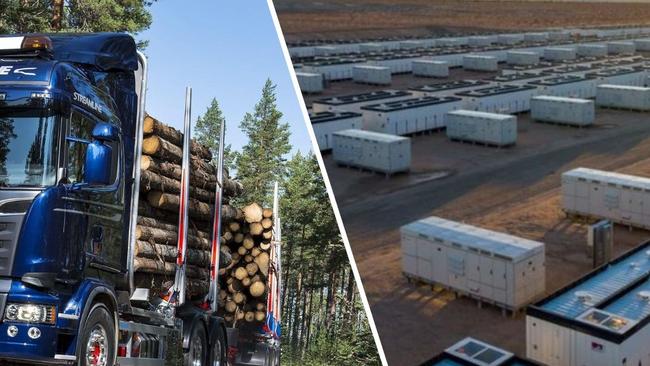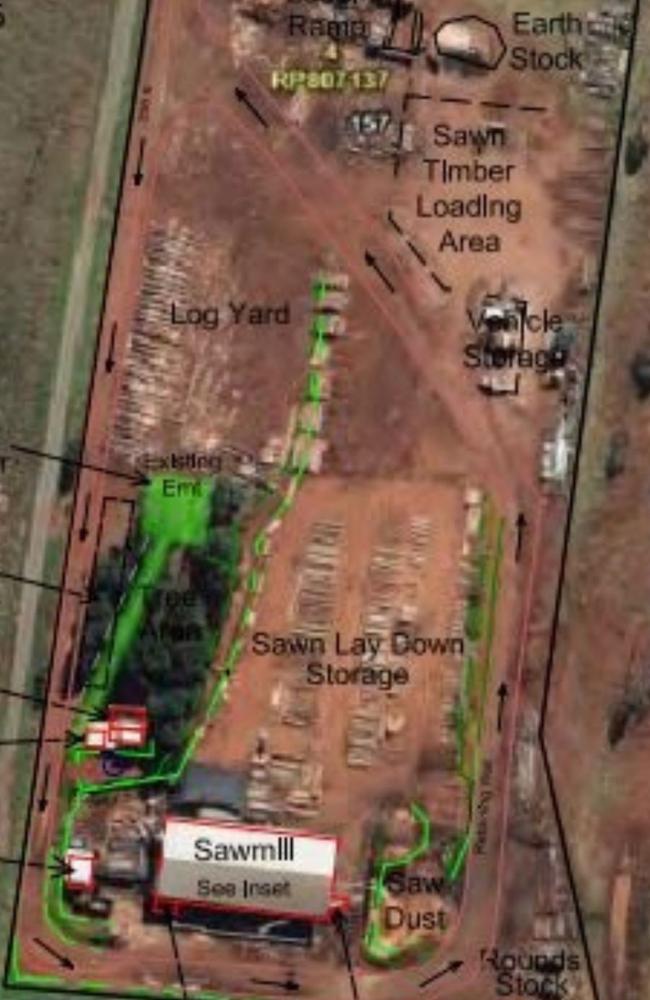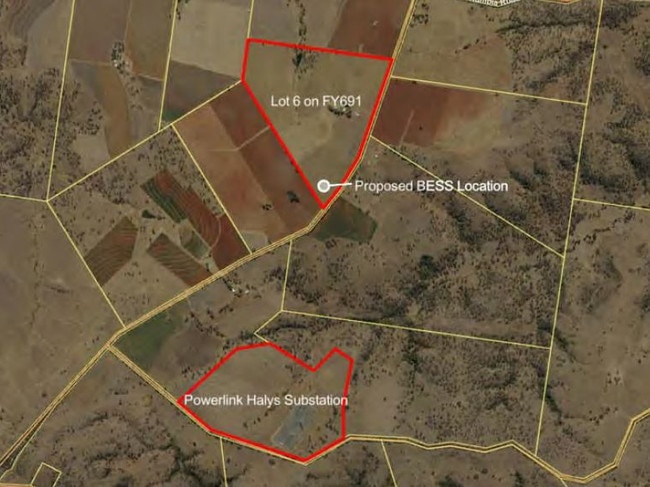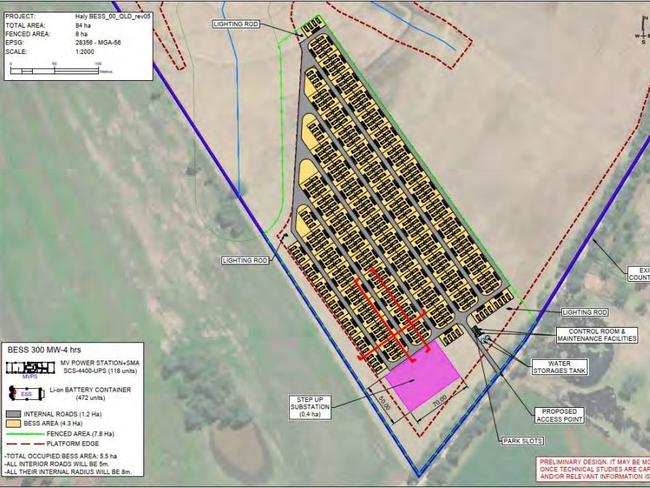South Burnett Council approves sawmill expansion and battery storage projects
The South Burnett Regional Council have voted on two major developments with possible implications for Goodger and Alice Creek. FULL DETAILS

Property
Don't miss out on the headlines from Property. Followed categories will be added to My News.
Two big development proposals came under the microscope at a special meeting of the South Burnett Regional Council on Thursday, with members clashing over renewable energy and small business expansion.
After a lively yet respectful back-and-forth, council voted to approve an application to significantly expand a sawmill at Goodger and to also build a battery energy storage system at Alice Creek.
Boonenne Timbers, located on more than 3ha of land at 157 Boonenne Road in Goodger, processes less than 5000 tonnes of timber product each year.
It now wants to boost that output to more than 10,000, but less than 20,000, tonnes per year.
It also want to increase its hours of operation.
The mill operates Monday to Friday, 6am-5pm, and 7am-noon on Saturdays and public holidays.
The increase will be 6am-6pm Mondays to Saturdays, 6am-3pm on public holidays and to allow maintenance works (when required) on Sundays.

Before the council voted on the motion to approve Boonenne Timbers’ application to expand their operation and increase their operating hours, Councillor Linda Little objected to the business being allowed to run heavy machinery on public holidays.
She said under normal circumstances the zoning of the property would not allow a business like a sawmill in that area, and felt that the objections of the neighbours should be considered.
“As it stands now, there are 13 public holidays in the year directly affecting the South Burnett,” Cr Little said.
“So we get to enjoy 13 public holidays a year, and that’s a small price to pay for the neighbours to be able to have some peace and quiet and be able to enjoy their lifestyle on their block of land.”
Councillor Ros Heit said she would go even further and believed the mill should not be allowed to operate on Saturdays either.
“I don’t think they should be doing heavy machinery in a rural area on a Saturday or on public holidays,” she said.
“I’m very supportive of small business but they can chainsaw between Monday and Friday, currently 6 to 5pm.”
“As a concession to the neighbours, if you’ve got family coming around on Saturday lunch time, do you want a whole lot of chainsawing up until 6 o’clock on a Saturday?”
Several councillors spoke against this restriction, stating small business could suffer if they were not allowed to perform heavy industrial works on Saturdays or public holidays and cited the noisy nature of many farming activities.
Ultimately, the council did not support Cr Little’s objection and they approved the extended trading hours.
The council received two public submissions objecting to the increased activity, with one neighbour specifically highlighting the potential issues with increased hours of operation.
“I would like to object to the extended working hours on Saturdays and public holidays of Boonenne Timbers as I live close to the mill and hear the noise very clearly,” the neighbour wrote.
“Public holidays are unacceptable, we have put up with their noise and have not complained but it needs to stop sometime.”
Both submissions also highlighted potential road safety issues with increased trucks travelling on the narrow dirt road.
“You can’t see trucks coming or going as there is a crest between our place and (the mill) that is a blind spot, and no one has clear vision from 1.5km away,” one submission said.
“We love our country road and to see it be overrun by constant traffic is just not on.
“We have koalas on both ends of the road which is also a worry with all the constant traffic.”

No decision reached in Joe Prendergast rape case, matter adjourned
Bjelke-Petersen Dam spilling into Barker Creek
“With reference to any well-regarded standard for road design, the existing road geometry and the construction standard of Boonenne Road is not suitable for the traffic likely to be generated by the development,” the second submission said.
Both submissions also alleged the mill was producing more than the currently allowed 5000 tonnes per year and working longer hours than it was approved to.
The second project the council voted on was the development of a battery energy storage system to be built at 1196 Ellesmere Road, Alice Creek.
The council officer recommendation was to approve the project, subject to an arborist looking at the site and ensuring the “appropriate vegetation on the boundary periphery of the block is chosen to reduce fire impacts and maximise noise reduction and enhance visual amenity”.
The proposed site is cleared agricultural land, which has been determined to have “limited cropping capacity” due to the quality of the soil.

Multiple councillors said they did not want to approve the project but they felt that they did not have strong enough planning reasons to be able to fight a rejection in court.
They also said they did not think it was fair for ratepayers to be responsible for the associated legals costs.
Mayor Kathy Duff said she would be voting against the project on principle and believed people in the region had a right to choose where renewable energy projects are developed.
“On planning grounds, it’s not in our planning scheme,” Mayor Duff said.
“We want the chance to have them in our planning scheme where we want them and not where they just choose to be.”
“When do we say, ‘no, that’s not good enough for our region?’
“We don’t want to be covered in (renewable energy infrastructure) … We want the right to have a say in it.”
Councillor Danita Potter said while she did not support the project, the best she could do was ensure the developers complied with the regulations set out in the project documentation.
“We understand that (renewable energy projects) are coming in. None of us really want them but these things are now being forced upon us,” Cr Potter said.
“The fact is this is peanut land, this is amazing land they are putting this on.
“So, I am against this as much as anyone else but because we know what’s going to happen, the best I can do is make sure these conditions are lived up to, in regards to landscaping and fire breaks and the amenity issue.”
Cr Little asked whether the water testing reports that were required to be done and submitted to council upon completion would be shared with the neighbouring farmers.
CEO Mark Pitt said the reports fell under privacy of information laws, so would not be shared outside of council.
He said even if someone submitted a freedom of information request, the information belonged to the “entity” and they would have to be asked for permission to release the anything.
The battery energy storage system will take up around 4.7ha of the 84.45ha property, which is a little more than 5 per cent of the land area, and intends to include 472 battery modules and 118 inverters.
The application has been lodged by X-Elio Australia, the subsidiary of a Spanish company specialising in renewable energy projects.
In Queensland, X-Elio developed the Blue Grass solar farm and the Sixteen Miles solar farm in the Southern Downs and has proposed a 720MWp solar farm and battery storage facility in the North Burnett.

According to council documents, the project has received three “properly made” public submissions against it.
A neighbouring farmer raised concerns about the potential for waterways to become contaminated, as Haly Creek runs through the property.
“If contamination occurs and my cattle start dying – cattle that have been bred and raised on this land for generations – who will bear the responsibility?” he wrote.
“This is our livelihood and such a loss would be catastrophic for my family and our farming operations.”
He also voiced his worry about how the development would impact the liveability of the area and how it could negatively influence the “rural farming heritage” the community values.
While the application stated the suggested fire suppression systems were adequate given the low risk and scale of the project, multiple submissions cited the risk of fire and explosions as a top concern.
“(The) unmanned site response is 20 mins, (dependant on the location of contractor),” one submission said.
“If (there is a) bushfire or fire on site, the lapse of time could indicate a significant amount of damage occurring and spread to surrounding landowners.”
The meeting was held at Warren Truss Chamber, Glendon Street Kingaroy at 10am on Thursday, April 3.
The agenda, which included all the relevant documents related to both proposals, has been published on the council website and is available for any member of the public to access.





